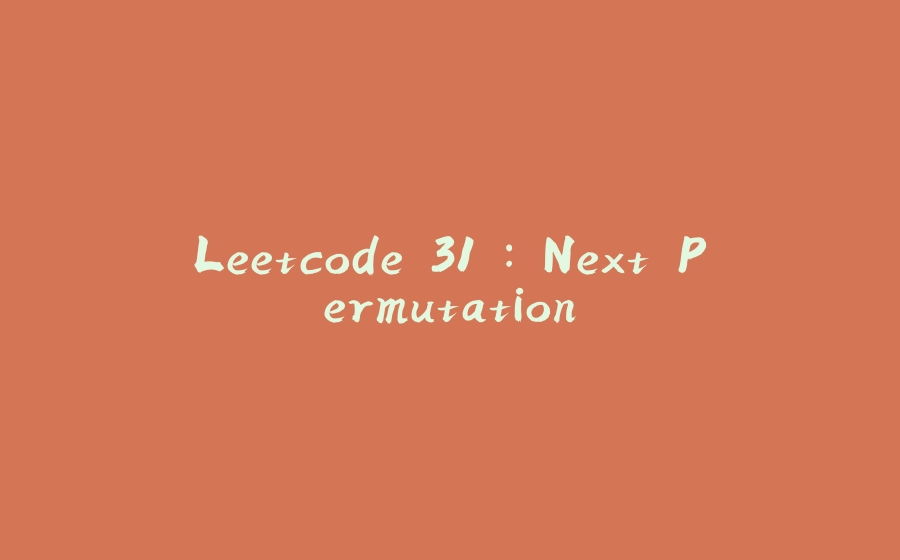Problem Statement
Implement next permutation, which rearranges numbers into the lexicographically next greater permutation of numbers.
If such an arrangement is not possible, it must rearrange it as the lowest possible order (i.e., sorted in ascending order).
The replacement must be in place and use only constant extra memory.
Test Cases
Example 1:
Input: nums = [1,2,3]
Output: [1,3,2]
Example 2:
Input: nums = [3,2,1]
Output: [1,2,3]
Example 3:
Input: nums = [1,1,5]
Output: [1,5,1]
Example 4:
Input: nums = [1]
Output: [1]
Constraints
1 <= nums.length <= 100
0 <= nums[i] <= 100
Algorithm :
- Start traversing from the right to left.
- Make sure while traversing from the right to left, we are having an increasing order pattern.
- If this increasing order pattern continues until we complete the traversal, then the given array is in its greatest permutation possible and there are no other next greater permutation. This time just reverse the whole array.
- Otherwise, if at any of the index say
i, the increasing order pattern is violated, just stop at that position and mark it as the violated index. - Now from that violated index
isearch for another indexjto the right ofisuch that there is a numbernums[j]which is just greater thannums[i]. - After finding
j, just swap the numbers atnums[i]andnums[j]. - Now reverse the array from
i + 1tolength - 1where length is the size of array. - This will give us our next greater permuatation.
Code
class Solution {
public void nextPermutation(int[] nums) {
if (nums == null || nums.length <= 1) {
return;
}
// we will be going from right to left and search for the index
int violatingIncreasingOrder = -1;
int length = nums.length;
for (int i=length - 1; i>0; i--) {
if (nums[i] > nums[i - 1]) {
violatingIncreasingOrder = i - 1;
break;
}
}
// if already in greatest form, then just reverse the whole array
if (violatingIncreasingOrder == -1) {
reverse(nums, 0, length - 1);
return;
}
int nextGreaterElementOfI = nums[violatingIncreasingOrder + 1];
int violationNumber = nums[violatingIncreasingOrder];
int nextGreaterIndex = violatingIncreasingOrder + 1;
// find for the next greater index which is just greater than the violating number
for (int i=violatingIncreasingOrder + 1; i<length; i++) {
int currentNumber = nums[i];
if (currentNumber > violationNumber && currentNumber <= nextGreaterElementOfI) {
nextGreaterElementOfI = currentNumber;
nextGreaterIndex = i;
}
}
// reverse from the point of violation and the next greater element of that violation number
swap(nums, violatingIncreasingOrder, nextGreaterIndex);
reverse(nums, violatingIncreasingOrder + 1, length - 1);
}
private void reverse(int [] nums, int i, int j) {
while (i < j) {
swap(nums, i, j);
i++;
j--;
}
}
private void swap(int [] nums, int i, int j) {
int temp = nums[i];
nums[i] = nums[j];
nums[j] = temp;
}
}
Enter fullscreen mode Exit fullscreen mode
Complexity :
-
Here we are traversing through the array from right to left one time and from the point of violation to right one time. So it will result in O(n) where n = size of array.
-
We are not making use of any extra space, so space complexity is O(1).
Github link :
 Rohithv07 / LeetCode
Rohithv07 / LeetCode
LeetCode problems that are solved.
LeetCode
LeetCode problems that are solved.
-
take the bit of the ith(from right) digit:
bit = (mask >> i) & 1;
-
set the ith digit to 1: mask = mask | (1 << i);
-
set the ith digit to 0: mask = mask & (~(1 << i));
 Rohithv07 / LeetCodeTopInterviewQuestions
Rohithv07 / LeetCodeTopInterviewQuestions
Leetcode Top Interview questions discussed in Leetcode. https://leetcode.com/explore/interview/card/top-interview-questions
LeetCodeTopInterviewQuestions
Leetcode Top Interview questions discussed in Leetcode. https://leetcode.com/explore/interview/card/top-interview-questions-easy/
Also Question answered from CodeSignal.com : https://app.codesignal.com/


























暂无评论内容